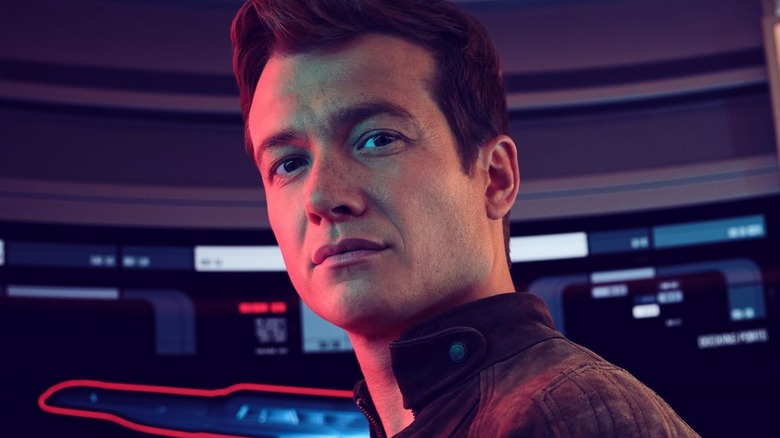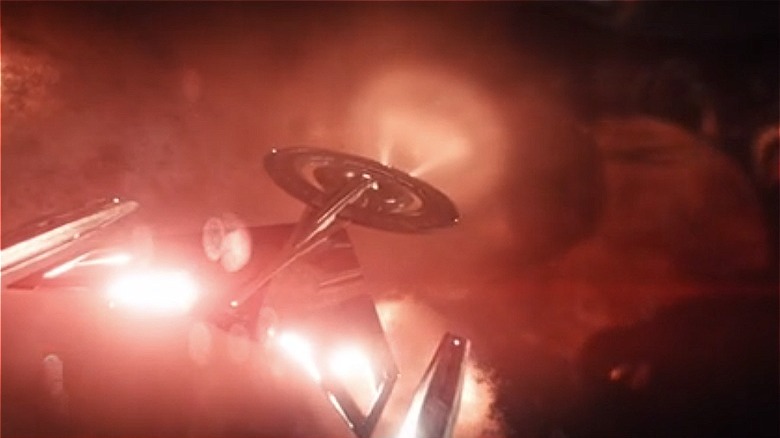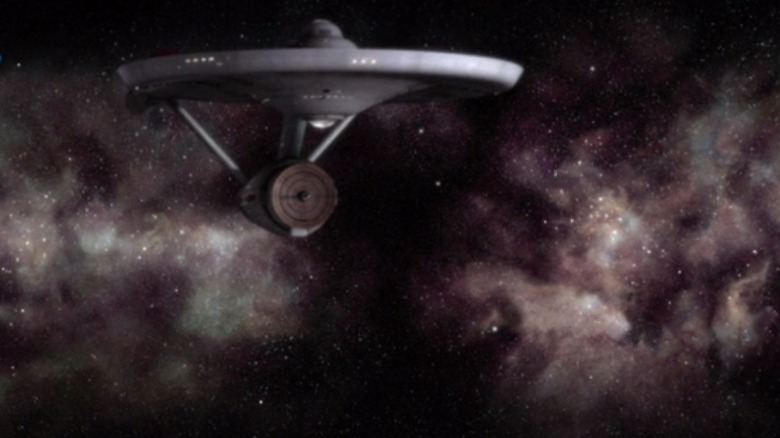Captain Shaw's Characterization Of Jack Crusher In Picard Season 3 Episode 2 Doesn't Make Sense In The Franchise's Timeline
Contains spoilers for "Star Trek: Picard" Season 3, Episode 2
"Star Trek" has had so many episodes and has explored so many planets that it would seem that they're trekking across the entire vastness of space. But in actuality, the entire franchise is mostly confined to one area. As StarTrek.com confirms, almost every episode of all the many "Star Trek" series takes place within the Milky Way Galaxy, where Earth is located. In fact, most "Star Trek" shows only use half of the galaxy, with the United Federation of Planets being entirely located within what are known as the Alpha and Beta Quadrants.
Even "Star Trek: Voyager" – which focuses on a starship that is flung so far away from Earth that it would take 75 years to return home — simply takes place in a different quadrant of the same galaxy known as the Delta Quadrant. In "Star Trek: Deep Space Nine," the characters discover a wormhole that takes them to the Gamma Quadrant, but that's simply another one of the four quadrants of the same galaxy.
Since "Star Trek" tries to use real science in its science fiction, it's likely that the refusal to leave the galaxy very often comes from the fact that scientists are still learning about other galaxies and the space between them. According to Universe Today, the space between galaxies is believed to be made up of a type of plasma called the intergalactic medium that may be heated up to as much as millions of degrees.
Traveling through that would likely be difficult even in the distant future of the "Star Trek" universe, yet in the latest episode of "Star Trek: Picard," it would seem that either the writers or one of the characters completely forgets that "Star Trek" is not an intergalactic franchise.
Cue the Beastie Boys
In "Star Trek: Picard" Season 3, Episode 2, "Disengage," Captain Liam Shaw (Todd Stashwick) discovers that Jack Crusher (Ed Speleers) has multiple aliases and warrants out for his arrest and insists on turning him over to Captain Vadic (Amanda Plummer). In the process, Shaw refers to Crusher as an "intergalactic fugitive." That certainly makes him sound like a master criminal, but either Shaw or the writers made an important mistake with that phrase.
The Season 3 premiere of "Picard" establishes that we're in the 25th century, so it can be pretty certain that humans haven't suddenly started hopping between galaxies considering the immense difficulty the USS Discovery has when crossing the galactic barrier 700 years later, in the 32nd century. Admiral Charles Vance (Oded Fehr) says early on in the "Star Trek: Discovery" Season 4 episode that the Federation has never done this before, so it's hardly possible that Crusher has been committing crimes in other galaxies that Starfleet is aware of. It's more likely that Crusher is merely an interplanetary fugitive, or maybe even an inter-quadrant fugitive, but he could hardly be an intergalactic one.
Where a few people have gone before
However, Admiral Vance isn't quite correct. The Federation has left the galaxy before; it's just not particularly common. In the "Star Trek: The Next Generation" episode "Where No One Has Gone Before," a mysterious being known only as the Traveler flings the Enterprise-D and her crew outside of the galaxy, but since the crew manages to find a way to get back by the end of the episode and they didn't leave the galaxy under their own power, that instance is largely ignored.
In the similarly titled episode of the original series "Where No Man Has Gone Before," the Enterprise leaves the galaxy to investigate what happened to another ship 200 years earlier. However, when they hit the barrier, several vital ship systems are damaged, and they turn around.
As the USS Discovery is preparing to leave the galaxy, Ruon Tarka (Shawn Doyle) warns that the galactic barrier can "fry your frontal cortex," which is likely a reference to the nine crew members of the Enterprise who die as a result of their attempt to cross the barrier in "Where No Man Has Gone Before." Either way, leaving the galaxy is incredibly rare and difficult in the "Star Trek" universe, even centuries after "Star Trek: Picard" is set.


